Career Night Information Session
Date
Tuesday November 7, 20235:00 pm - 6:00 pm
Location
Via Zoom
University Wide
MyQueensU - SOLUS, MyHR and more Office 365 Outlook on the web - Email onQ Library eReserves Web ProxyFaculty / School Portals
Business - Program Portals Education - Faculty & Staff Portal Grad Studies - Faculty & Staff Portal Health Sciences - Elentra Law - QLaw Change password / Manage NetIDDate
Tuesday November 7, 2023Location
Via ZoomDate
Friday November 3, 2023Location
Robert Sutherland Hall Room 334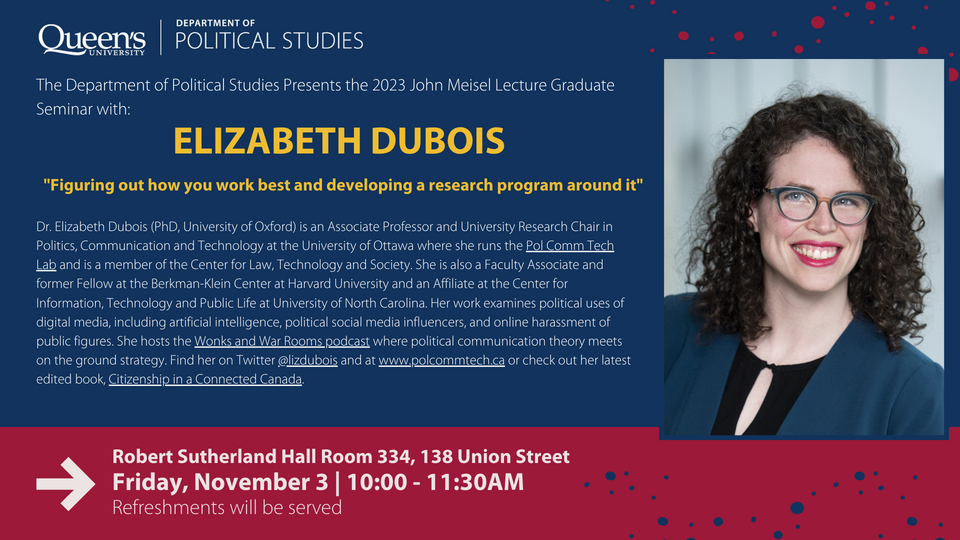
Biography:
Dr. Elizabeth Dubois (PhD, University of Oxford) is an Associate Professor and University Research Chair in Politics, Communication and Technology at the University of Ottawa where she runs the Pol Comm Tech Lab and is a member of the Center for Law, Technology and Society. She is also a Faculty Associate and former Fellow at the Berkman-Klein Center at Harvard University and an Affiliate at the Center for Information, Technology and Public Life at University of North Carolina. Her work examines political uses of digital media, including artificial intelligence, political social media influencers, and online harassment of public figures. In 2019, she co-led the Digital Ecosystem Research Challenge which brought together 18 research teams to examine uses of digital media in the 2019 Federal Election in Canada. She leads the multi-disciplinary Pol Comm Tech Lab which includes political scientists, computer scientists, and communication students. She collaborates internationally with non-profits, technology companies, journalists, and academics. She also hosts the Wonks and War Rooms podcast where political communication theory meets on the ground strategy. Her public writing has appeared in Maclean's, The Globe and Mail, the Toronto Star, Policy Options, The Conversation, Salon and been featured in many others. Find her on Twitter @lizdubois, at www.polcommtechlab.com or check out her latest edited book, Citizenship in a Connected Canada.
Department of Political Studies professor Oded Haklai comments on the situation on the ground in Jerusalem following Hamas' invasion of Israel and the ongoing evacuation efforts.
Department of Political Studies professor Oded Haklai comments on what the situation has been like on the ground in Jerusalem over the past 48 hours.
Date
Friday October 20, 2023Location
Robert Sutherland Hall Room 334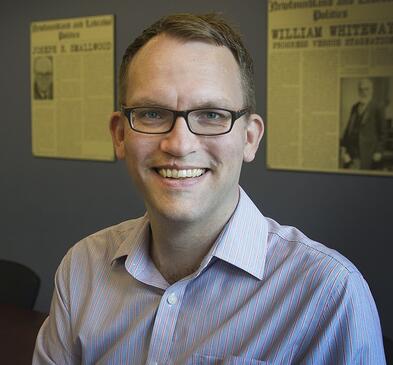
Light lunch served
The theory of retrospective voting – the idea that voters reward and punish incumbents at the ballot box according to their record of performance in office – is one of the dominant models in the study of voting behaviour. The model also aligns with common intuitions about how democracy ought to work. Yet, we have remarkably little credible evidence for the theory’s fundamental premises: that citizens integrate streams of performance information into manageable impressions of the state of the world during an incumbent’s term, and then form appraisals of incumbents based on those impressions. In this talk, I will advance a novel experimental framework for studying the microfoundations of retrospective voting. I will also report results from an extended series of experiments applying the framework to a range of critical questions regarding how, and how well, voters evaluate incumbent performance. I will conclude that the results suggest voters process performance information in a way that ably, if not always optimally, identifies competent incumbents.
Dr. Matthews (Ph.D., UBC) specializes in the study of elections, voting and public opinion in established democracies. While much of his work focuses on Canada or the United States, he is also a student of comparative political behaviour. His research focuses primarily on the effects of election campaigns on political decision making, the impact of institutional context on policy attitudes, and retrospective voting. He is past holder of the Fulbright Canada Visiting Research Chair at Vanderbilt University and a Humboldt Fellowship at the University of Mannheim.
Term Adjunct
He/Him
Political Studies
MA (Cantab), PhD (UEA), FRCS
Term Adjunct
Politics of development; social democracy; civil society and citizenship; politics of India; and an interest now a bit historic in agrarian political economy
I have a rather long history as an anthropologist with interests in political economy, and of working in departments of Development Studies, at the University of East Anglia, and the London School of Economics, in the UK, at the National University of Singapore, and in the School for International Studies at Simon Fraser University, where I am now Professor Emeritus. Long standing research interests in the society and politics of India, where I have lived for extended periods.
2023 Liberty: the Indian Story. Delhi: Speaking Tiger (forthcoming)
2022, 'Why was the pandemic poorly managed by the Government of India? A State-in-Society Approach', Pacific Affairs, 95(4): 707-729
2020 India: Continuity and Change in the 21st Century. Cambridge: Polity (with Craig Jeffrey and Trent Brown)
Date
Friday November 24, 2023Location
Robert Sutherland Hall Room 334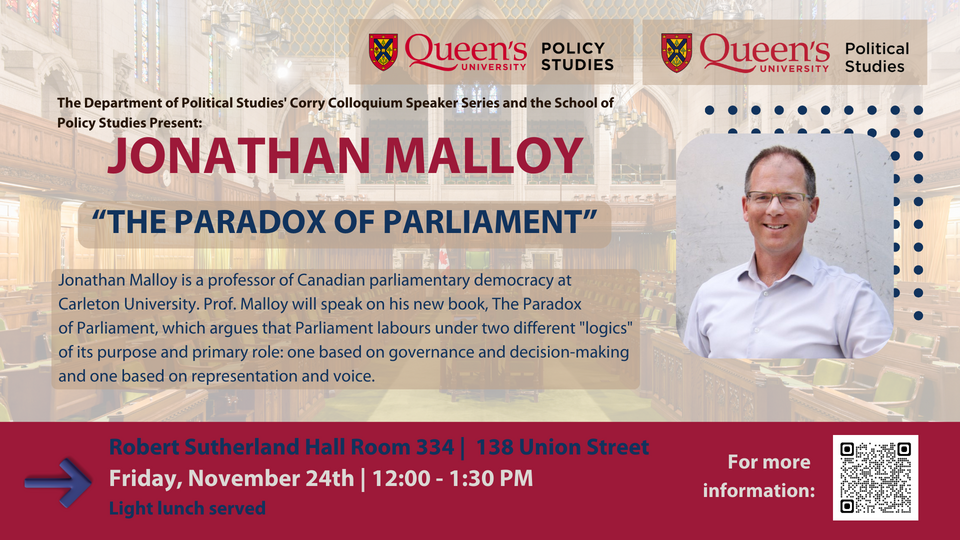
Light lunch provided
Jonathan Malloy is a professor of Canadian parliamentary democracy at Carleton University. Prof. Malloy will speak on his new book, The Paradox of Parliament.
About the book:
The Paradox of Parliament provides a comprehensive analysis of all aspects of Parliament in order to explain the paradoxical expectations placed on the institution. The book argues that Parliament labours under two different "logics" of its purpose and primary role: one based on governance and decision-making and one based on representation and voice. This produces a paradox that is common to many legislatures, but Canada and Canadians particularly struggle to recognize and reconcile the competing logics.
In The Paradox of Parliament, Jonathan Malloy discusses the major aspects of Parliament through the lens of these two competing logics to explain the ongoing dissatisfaction with Parliament and perennial calls for parliamentary reform. It focuses on overarching analytical themes rather than exhaustive description. It centres people over procedure and theory, with strong emphasis given to dimensions of gender, race, and additional forms of diversity. Arguing for a holistic and realistic understanding of Parliament that recognizes and accepts that Parliament evolves and adapts, The Paradox of Parliament puts forward an important and novel interpretation of the many facets of Parliament in Canada.
Biography:
Jonathan Malloy (BA, Waterloo | MA, Queen's | PhD, Toronto) holds the Honourable Dick and Ruth Bell Chair in Canadian Parliamentary Democracy and is Professor in the Department of Political Science at Carleton University. He previously served as department chair from 2012-2018 and currently serves as Associate Dean (Research and International) in the Faculty of Public Affairs. He has taught at Carleton since 2000, after receiving his PhD from the University of Toronto and earlier degrees from the University of Waterloo and Queen’s University.
His interest in parliamentary government began when he served as an Ontario Legislative Intern in 1992-93. Since then, he has been teaching, writing, and thinking about Canadian political institutions. He served as president of the Canadian Study of Parliament Group from 2009-2013, and his book The Paradox of Parliament was published in spring 2023. He has also co-authored and co-edited two books on Ontario politics – The Politics of Ontario, co-edited with Cheryl Collier, and Fighting for Votes, co-authored with William Cross, Tamara Small and Laura Stephenson. He is also the co-author of Work Your Career: Get What You Want From Your Social Sciences or Humanities PhD, with Loleen Berdahl.
He has been a visiting Fulbright Chair at Duke University and a Visiting Fellow at the Australian National University, and is active in the Canadian Political Science Association. He is from Elmira, Ontario.
Date
Friday November 10, 2023Location
Robert Sutherland Hall Room 334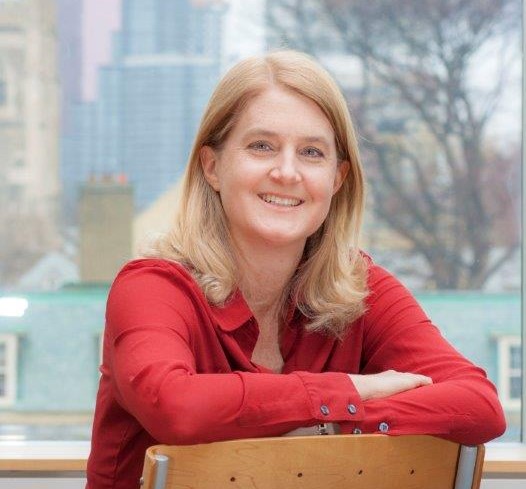
Light lunch served
Participatory democracy flourished in the 1960s and 1970s and inspired a generation of scholars who placed inclusive ideals at the core of normative theories of democracy. The defining feature of participatory democracy is the direct engagement of citizens rather than mediated forms of political activity such as electing representatives. Non-profit housing cooperatives are governed by a mix of direct and representative democracy, and they provide a natural laboratory for studying small group democracy. This paper relies on the method of grounded normative theory, which involves original empirical research to expand the archive of relevant texts to include more diverse perspectives.
The paper shows that the real world of participatory democracy is filled with more conflict than the original proponents predicted, and participation does not always create a sense of efficacy and an orientation to the common good, but it produces beneficial outcomes such as social solidarity and spaces of decommodification. Understanding the challenges entailed in participation is part of the process of developing a capacious normative democratic theory. By de-moralizing democracy, which involves orienting deliberation away from the language of judgement and principle, and focusing on practical activity, compromise, and pluralism, a revitalized approach to participatory democracy is possible.
Dr. Margaret Kohn is a professor of political theory at the University of Toronto whose primary research interests are in the areas of the history of political thought, critical theory, social justice, and urbanism. Prof. Kohn will tentatively speak about the results of a study on solidarity and democracy in non-profit housing cooperatives in Canada. The project, entitled “Demoralizing Democracy," sits at the intersection of political theory and urban studies.
Start Date
Friday October 20, 2023End Date
Thursday September 21, 2023Time
12:00 pm - 1:30 pmLocation
Robert Sutherland Hall Room 334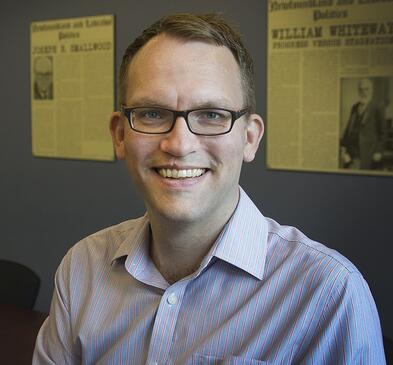
Light refreshments served
The theory of retrospective voting – the idea that voters reward and punish incumbents at the ballot box according to their record of performance in office – is one of the dominant models in the study of voting behaviour. The model also aligns with common intuitions about how democracy ought to work. Yet, we have remarkably little credible evidence for the theory’s fundamental premises: that citizens integrate streams of performance information into manageable impressions of the state of the world during an incumbent’s term, and then form appraisals of incumbents based on those impressions. In this talk, I will advance a novel experimental framework for studying the microfoundations of retrospective voting. I will also report results from an extended series of experiments applying the framework to a range of critical questions regarding how, and how well, voters evaluate incumbent performance. I will conclude that the results suggest voters process performance information in a way that ably, if not always optimally, identifies competent incumbents.
J. Scott Matthews (Ph.D., UBC) is an associate professor in the Department of Political Science at Memorial University, where he studies elections, voting and public opinion in established democracies. His research focuses primarily on the effects of election campaigns on political decision making, the impact of institutional context on political decision making, and retrospective voting. His research has appeared in the American Political Science Review, the American Journal of Political Science, and the Journal of Politics, among others. He is past holder of the Fulbright Canada Visiting Research Chair at Vanderbilt University and a Humboldt Fellowship at the University of Mannheim.
Date
Thursday October 5, 2023Location
Dunning Hall Room 11
Light refreshments served
Marlene Laruelle, Ph.D., is Research Professor of International Affairs and Political Sciences at the Elliott School of International Affairs, The George Washington University, and director of the Illiberalism Studies Program. She is the former director of the Institute for European, Russian and Eurasian Studies (IERES) and of the Central Asia Program. Dr. Laruelle received her Ph.D. in history at the National Institute of Oriental Languages and Cultures (INALCO) and her post-doctoral degree in political science at Sciences-Po in Paris. She has widely published on Russia’s ideologies and nationalism, on Russia’s foreign policy and soft power strategies.
